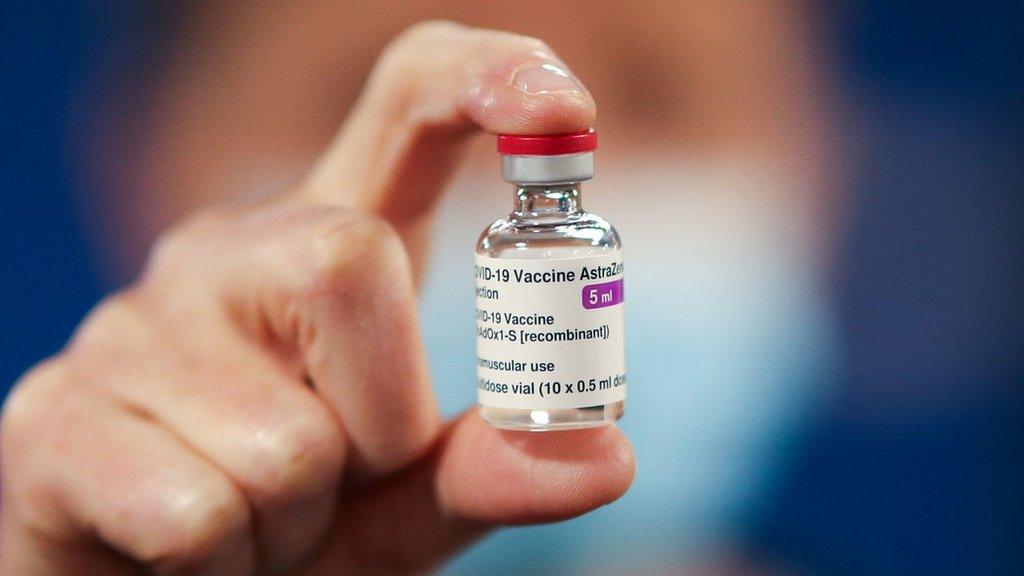Tower Hamlets: How do you vaccinate a London borough?
- Published
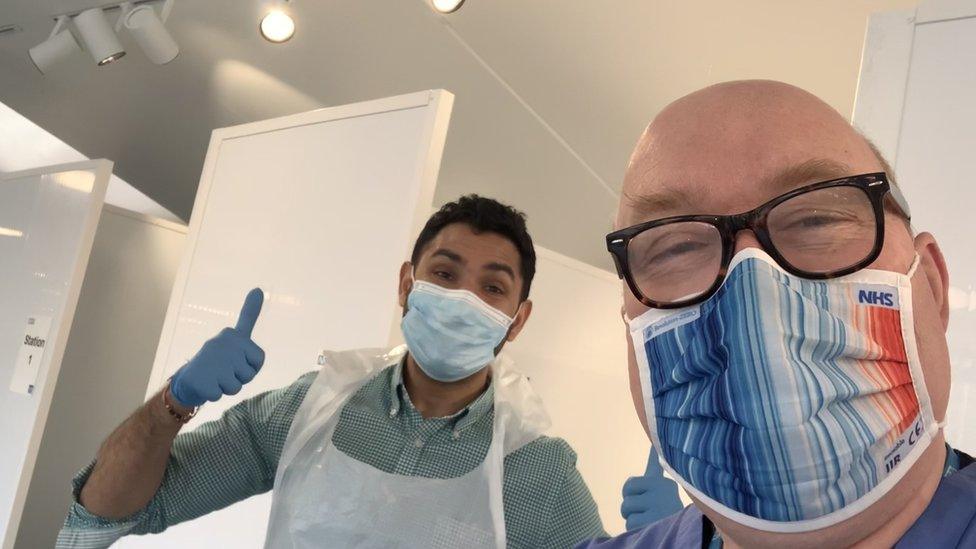
Dr Kamaldeep Tamber (left) and Dr Phillip Bennett-Richards volunteer at vaccination clinics in Tower Hamlets
In the last four months, almost 27 million people in England - more than 50% of the adult population - have received the first dose of a coronavirus vaccine.
At a local level, previous BBC analysis found the London Borough of Tower Hamlets had some of the lowest levels of vaccine coverage in terms of the total adult population.
The figure now stands at 27% but does not tell the full story of the vaccine rollout in the area.
The majority of the borough's residents are under 50, so have not been offered the vaccine yet. Among over-50s the coverage rises to 75% and in the over-70s age group, 83% have been vaccinated.
The BBC spoke to NHS and public health workers in the borough to gain an insight into how the rollout has progressed.
What is it like on the front line?
Dr Phillip Bennett-Richards, from the Aberfeldy Practice, is one of many health workers volunteering at local vaccine centres and pop-up clinics, inoculating about 10 people per hour, as well as doing his usual job.
"It's very moving and emotional to think you can be part of preventing infections among the population and the most vulnerable," he said.
"Especially when it involves re-establishing face-to-face relationships with people you've only spoken to on the phone over the last year."
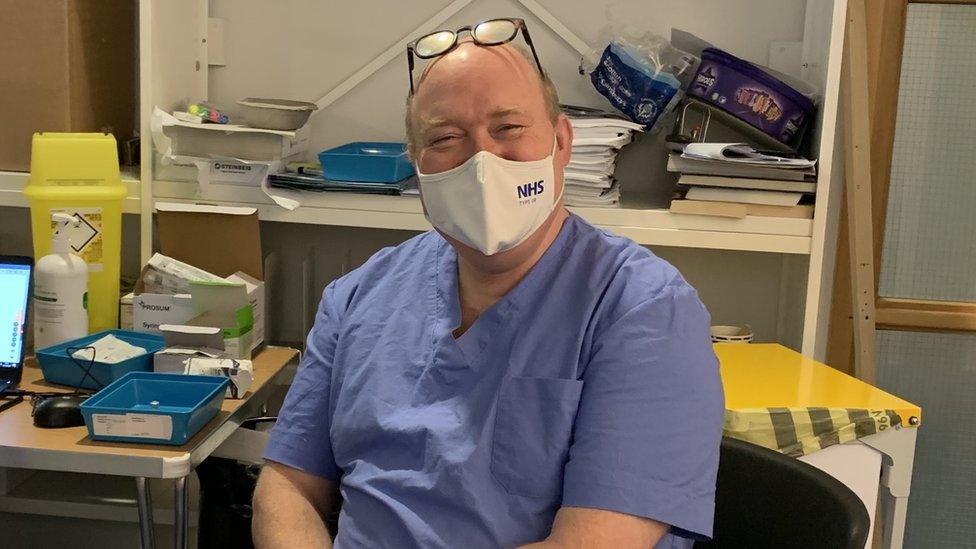
Dr Bennett-Richards said the rollout had been rewarding but challenging for GPs
Dr Bennett-Richards said December and January were the "darkest months" for the rollout, and having to ask 70 and 80-year-olds to go to centres some distance from their homes "in the cold and wet" was difficult.
He believes attitudes towards vaccines have changed among some patients in recent weeks.
"In addition to the younger, fitter cohorts, you're seeing older people coming in to get the vaccine who initially rejected it," he said, adding that he suspected they they wanted to "wait a month or so" to learn more about potential side effects and others' experiences.
Dr Kamaldeep Tamber, a GP at The Globe Town Surgery, also volunteers at vaccination centres across the borough - most recently at the Art Pavilion in Mile End - as well as conducting his normal clinics.
"The workload we have at the moment is very intense," he said.
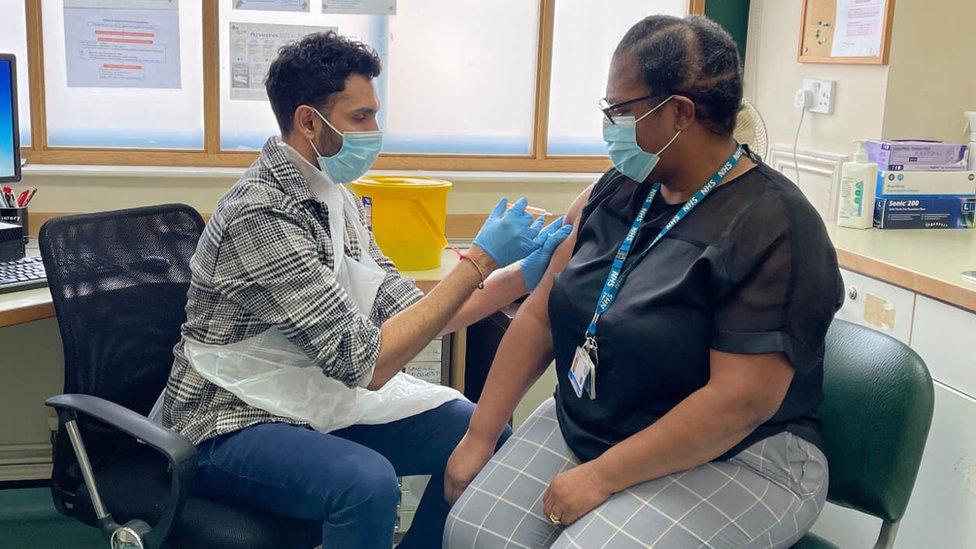
Dr Tamber said holding community clinics had been important in spreading information about the vaccine's benefits
Dr Tamber said more support staff were needed to stop teams from "burning out", but primary care workers, such as GPs, nurses and pharmacists, were "best placed" to drive the rollout forward.
"We have a great and knowledgeable set of healthcare professionals who understand and know the community," he added.
"We have the ability to do more with the right kind of support."
What have the challenges been?
Tower Hamlets' initial low vaccination coverage was a result of a combination of a young population, high infection rates in January and some hesitancy among residents, according to Dr Somen Banerjee, the borough's public health director.
Coverage among some Asian communities was affected at first by higher rates of infection in those groups than the general population," he said.
This caused a knock-on effect as those eligible had to wait for the vaccine until they had fully recovered.
But hesitancy also played a part in the early days of the rollout, and officials have worked hard to build trust in the vaccine in areas with low uptake, Dr Banerjee added.
When a clinic was held at the East London Mosque, he said the change in attitude was clear.
"The fact we had a vaccine centre in the mosque was an endorsement of it," he said. "It was evident people were there that wouldn't have come otherwise."
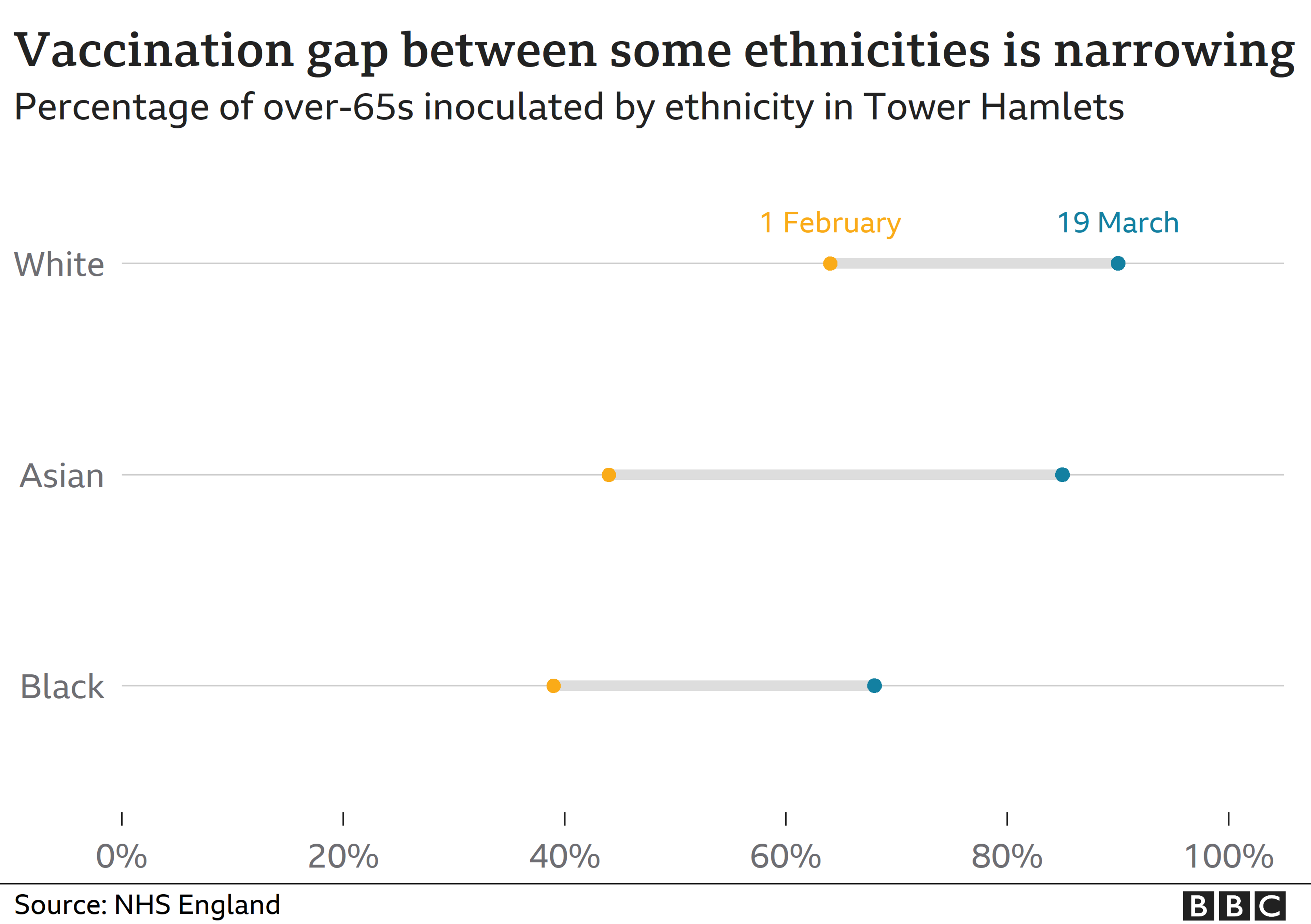
More detailed data shows that although there have been lower vaccination rates among Asian people in Tower Hamlets compared to the local white population, the gap has narrowed in recent weeks in people over 65.
However, rates among some groups, such as Black communities, are still behind others, according to Dr Banerjee.
He said although he was aware of misinformation being spread about the vaccine within these communities, there was no clear reason for the remaining gap, so health teams were working with them to understand the barriers and increase uptake.
What's next for the rollout?
"Normalising" the vaccine is the next challenge, according to Dr Banerjee, who wants to see more walk-in vaccine centres open up in the borough.
"There's a logic to taking your family and getting them vaccinated all in one go," he said.
"We might be having boosters in the future, so we need to have a model where this vaccine is normalised by expanding it to all GP practices and pharmacies."
Will AstraZeneca take-up be affected?
Dr Banerjee said vaccine confidence in the borough was "very sensitive" and he expects the widespread media reports on the AstraZeneca vaccine's possible link to rare blood clots to have an effect.
"Our role is to make people aware of the balance of risk," he added, pointing to recent evidence suggesting such a blood clot would normally be expected to affect about four people in a million.
"The chances of you being hospitalised with Covid are much higher."
- Published7 May 2021
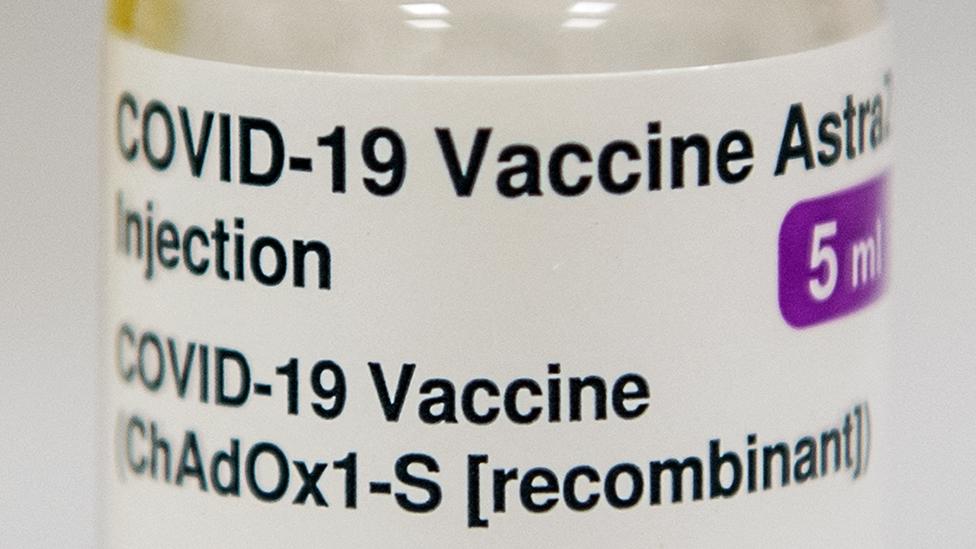
- Published2 April

- Published8 April 2021
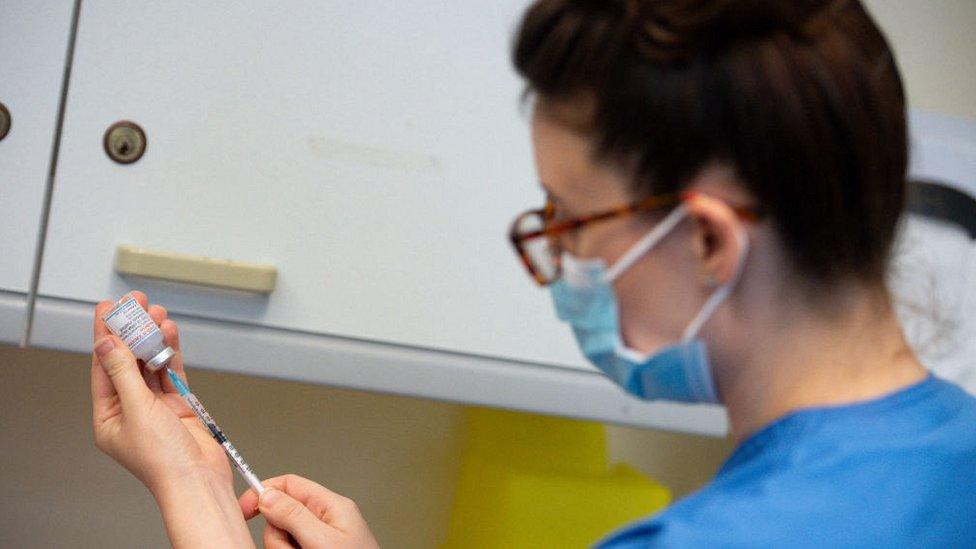
- Published8 April 2021
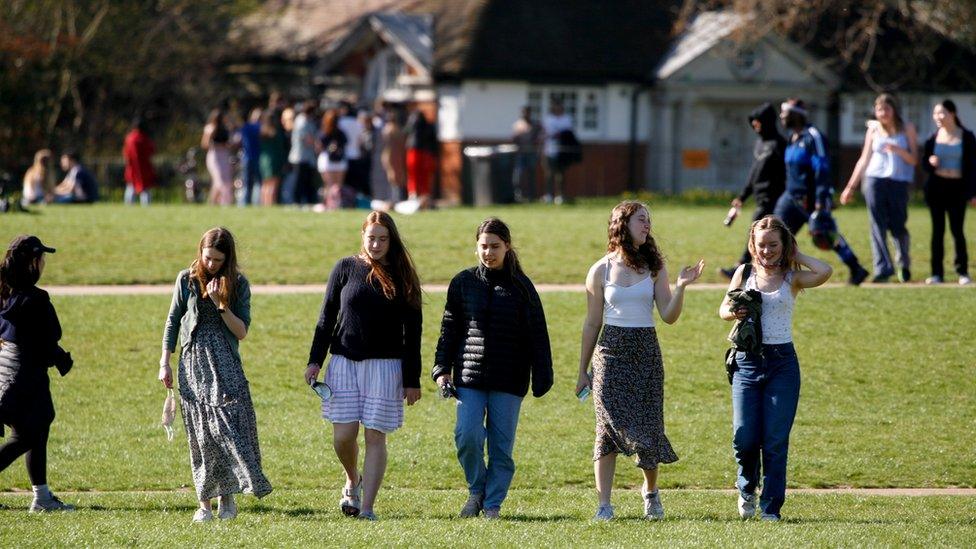
- Published7 April 2021
